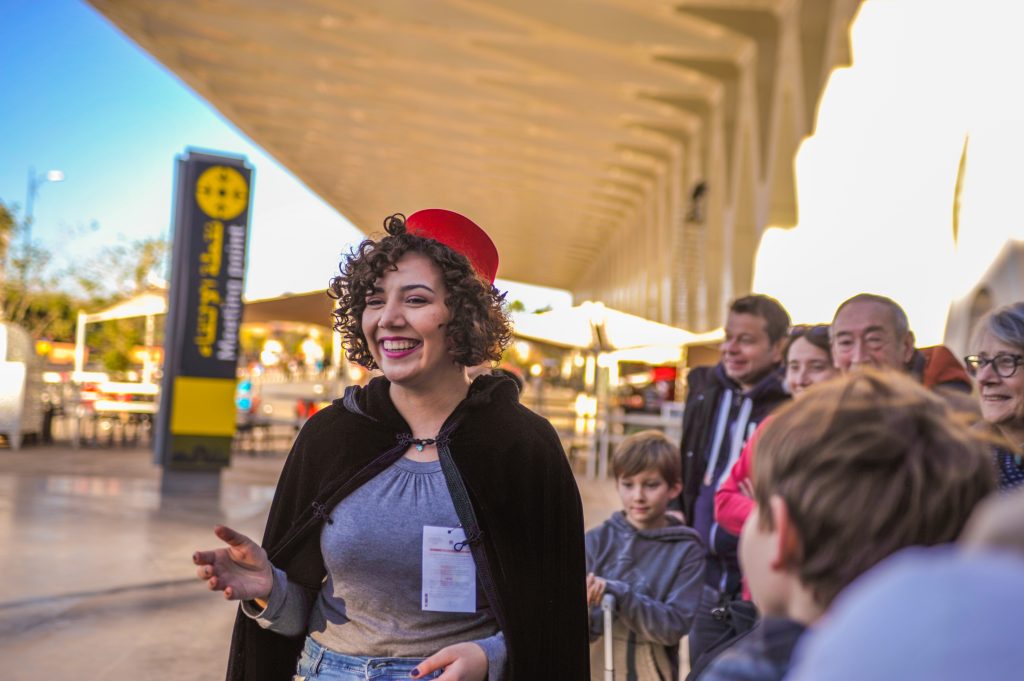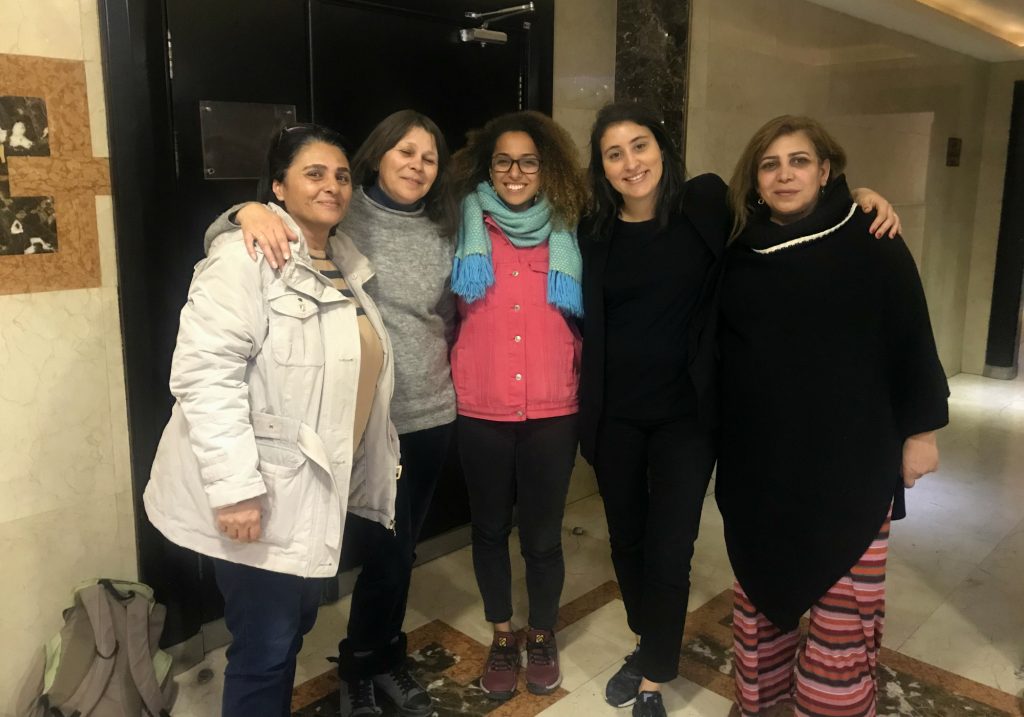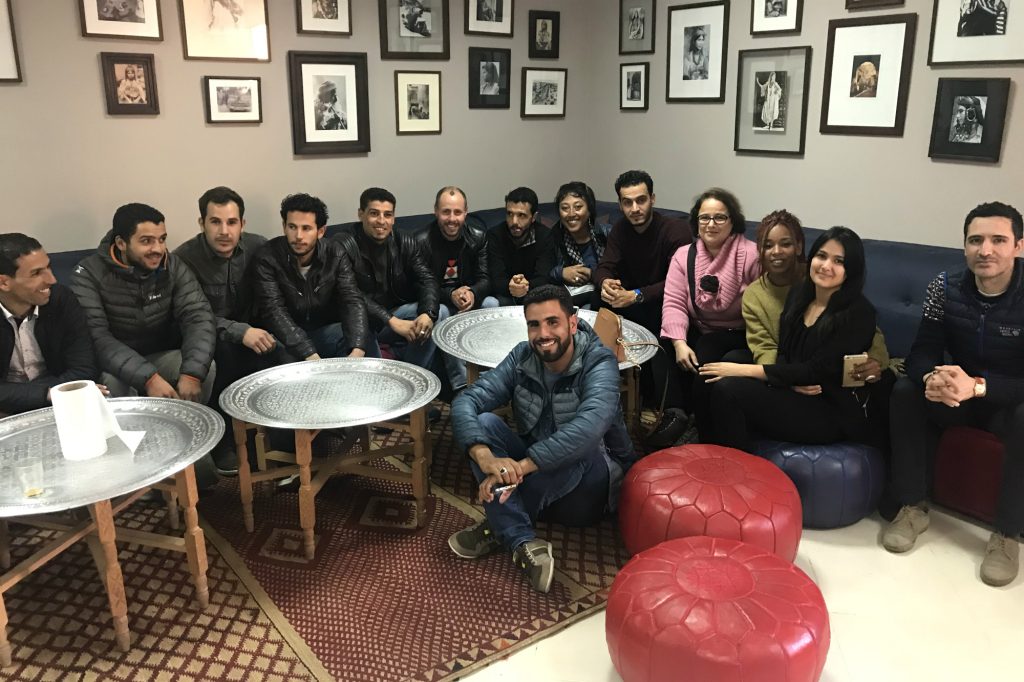On a global scale, women represent between 60 percent and 70 percent of the tourism workforce, according to data from the International Labor Organization. Yet, in some parts of the world, they are far outnumbered by men working as adventure travel business owners, guides, and office staff. This International Women’s Day (8 March), the Adventure Travel Trade Association (ATTA) honors women’s contributions in developing and advancing the industry around the world — especially in those destinations where there is still a gender imbalance.
Morocco is one such destination, but Zina Bencheikh hopes to change that. Bencheikh, who is based in Marrakech, is the regional general manager of Europe, North Africa, and Middle East for PEAK DMC, part of Intrepid Group’s network of destination management companies. In her role, one of her goals is to double the number of female trip leaders in Morocco by 2020. We checked in with Bencheikh to learn more about her work, her history with mentorship, and how she thinks women can be better empowered within the industry.

ATTA: What drove your interest in working in the adventure travel industry?
Bencheikh: Travel has always been a passion of mine from an early age: I was born in Morocco, but I was just one year old when my parents moved our family to Canada, and since then I’ve also lived in the United Kingdom and France.
I’ve always dreamed of working in travel, but I took a somewhat unconventional path to get there! After graduating in 2008, I spent three years working in corporate finance in Paris but found it unfulfilling. In 2010, I decided to move home to Morocco, where I accepted the role of finance manager for PEAK DMC Marrakech. My husband, who is also Moroccan, and I both felt strongly that it was important we return so we could contribute our knowledge and skills to the country’s development.
Over the past nine years I’ve challenged myself to learn about as many aspects of the business as I can. As I’ve changed roles and taken on more responsibility, I’ve had more opportunities to travel throughout North Africa, the Middle East, and Europe. Whenever possible, I like to take my two children (ages six and two) along with me to experience the richness of culture in this part of the world. I hope they will grow up to have the same passion for travel that I have.
ATTA: Tell us more about the goal to double the number of female trip leaders in Morocco by 2020. What does that mean, exactly? And, what strategy are you using to work toward that goal?
Bencheikh: At PEAK DMC, we specialize in small group travel led by a local tour leader. One of our main jobs as a business is to recruit, train, and manage these local leaders. Two years ago, we set a company-wide global goal to double the number of female tour leaders working with us by 2020. This isn’t an easy feat in some of the countries where we operate, such as Morocco, where women working outside the home isn’t the norm.
In 2017, when I became general manager for Morocco, we had 50 tour leaders — but not a single female tour leader. In Moroccan society, tour leading isn’t seen as a suitable job for women as the nature of the job means you are traveling away from home and in the company of foreign tourists. Only four percent of tour leaders in Morocco are female and, of these, very few speak English.
I took on the Moroccan Ministry of Tourism to challenge its view that women don’t want to become tour leaders. As a result, the Ministry issued new tour guide licenses for the first time in 10 years. We wanted to get as many women to apply as we could, so I encouraged all the women in the office to apply and even helped them with their paperwork. We had five women pass the test this year. This is a record number of female tour guides in all of Morocco, and as of this month we have 13 female leaders working with us. It’s the highest number for a DMC in Morocco.
While these numbers seem promising, we still have a long way to go to reach gender parity within the tour-leading industry and within Morocco’s tourism industry in general. We’re currently working on finding the next generation of female tour leaders (especially in rural areas) by partnering with Education for All. This non-profit provides boarding houses for girls in rural areas to help ensure they get an education. Importantly, it will provide them with the support they need to learn English — an essential skill in leading tours.

ATTA: Why is it important to you to get more female tour leaders in Morocco? What are the challenges you face to achieve this goal?
Bencheikh: Women make up the majority of the tourism workforce globally, but tend to be in the lowest paid jobs and often perform a large amount of unpaid work in family tourism businesses.
However, tour leading is a well paid job in Morocco. The industry is well regulated with the number of guides limited by the number of licenses issued by the government. This means demand often exceeds supply and, therefore, guides are well compensated, compared to many other jobs. If this job was made more accessible and had more visibility to women, I am sure many would be interested in it as it’s really a great career.
In terms of challenges, there are three key ones:
- Education and training. In a country that attracted 11 million tourists in 2018, why don’t we have a guiding school? We need guides to receive proper training.
- Cooperation from local government. Tourism is the second-largest industry in Morocco. The percentage of female guides is still extremely low. If we talk about mountain guides in particular, there are only nine in the whole country, and only three of them speak English. That’s not enough to respond to the demand.
- Cultural and social acceptance. Unfortunately, the idea of female tour guides is still seen as very controversial by male guides, other industry stakeholders, and society at large.
Bencheikh: I’ve been with PEAK DMC for eight years now, and I’ve been lucky enough to have had PEAK DMC’s managing director, Natalie Kidd, as a mentor and role model since the beginning. Nat is an inspirational figure for our female staff globally; she’s grown our business from just one DMC in Vietnam in 2005 to now having 21 DMCs across four continents.
Natalie is based in Australia but she was coincidentally visiting our office in Marrakech the week I started as finance manager. On my very first day, she took me aside and told me how happy she was that I joined the team and she had a lot of confidence in me. I don’t know what made her say that as she didn’t even know me then, but it made me feel trusted and supported right from the very start.
I’ve always been someone who’s hungry for the next opportunity, and Natalie recognized this and kept pushing me to do more. Her encouragement and belief in my ability has been instrumental through my career progression with PEAK DMC — from finance manager all the way to regional general manager for Europe, North Africa, and the Middle East, my current role.
ATTA: How have you assisted up-and-coming women in adventure travel?
Bencheikh: In 2017, we introduced a global mentoring program and a Women’s Leadership Forum. These programs provide women within our business opportunities to be mentored by senior managers as well as to connect our future leaders across the globe with our global leadership team.
In Marrakech, we have 27 women and 14 men in the office. Of my five department managers, three are female. They are very ambitious and highly educated women who have been able to take advantage of the development opportunities we offer. For example, two of them attended the Women’s Leadership Forum and many more have benefited from the global mentoring program.
The best thing about my role is that I can make a difference. As a Moroccan woman, they see me as an inspiration and I take that responsibility very seriously. Recently, one of my younger employees took up a position as finance manager in our office in Istanbul and thanked me directly for giving her the courage to apply for the position. That’s the kind of thing that really makes me love what I do.

ATTA: How can empowering women help empower adventure tourism as a vital economic driver?
Bencheikh: In Morocco and many other countries around the world, a large percentage of the workforce depends on tourism for their livelihoods. The challenge is making sure the benefits of tourism are spread as evenly as possible, in particular to women and other marginalized groups who haven’t traditionally had access to the same opportunities.
In the travel industry currently, women are more likely to be working at an administrative level than men, who are more inclined to reach professional-level tourism employment. As a result, women’s average take-home pay is much lower than men’s. Tourism also has immense potential to encourage more females to become entrepreneurs — with women being almost twice as likely to be employers in the tourism industry than in other sectors. Plus, research shows these women often employ more women than men.
At PEAK DMC, we aim to provide locally owned, small businesses with short-term loans so they can expand their businesses or improve their product offerings. We recognize that by contributing to their own economic development, we contribute to ours in the long term by creating shared value. Gender-equal practices and policies should be more widely regulated across the industry. This includes equal opportunity, equal pay, and supplier contracts.
This article is part of an Adventure Travel Trade Association (ATTA) initiative addressing important topics identified as critical to the protection and continued advancement of the adventure travel industry. Each initiative — eliminating plastics, women in leadership, climate action, and young leaders — has a dedicated team focused on building awareness of, advancing educational opportunities in, and creating a lasting impact on each of these areas within the adventure travel industry. We invite you to visit the ATTA’s initiatives page where you can access reports, read the latest news, participate in active projects, and join conversations within the membership community.
